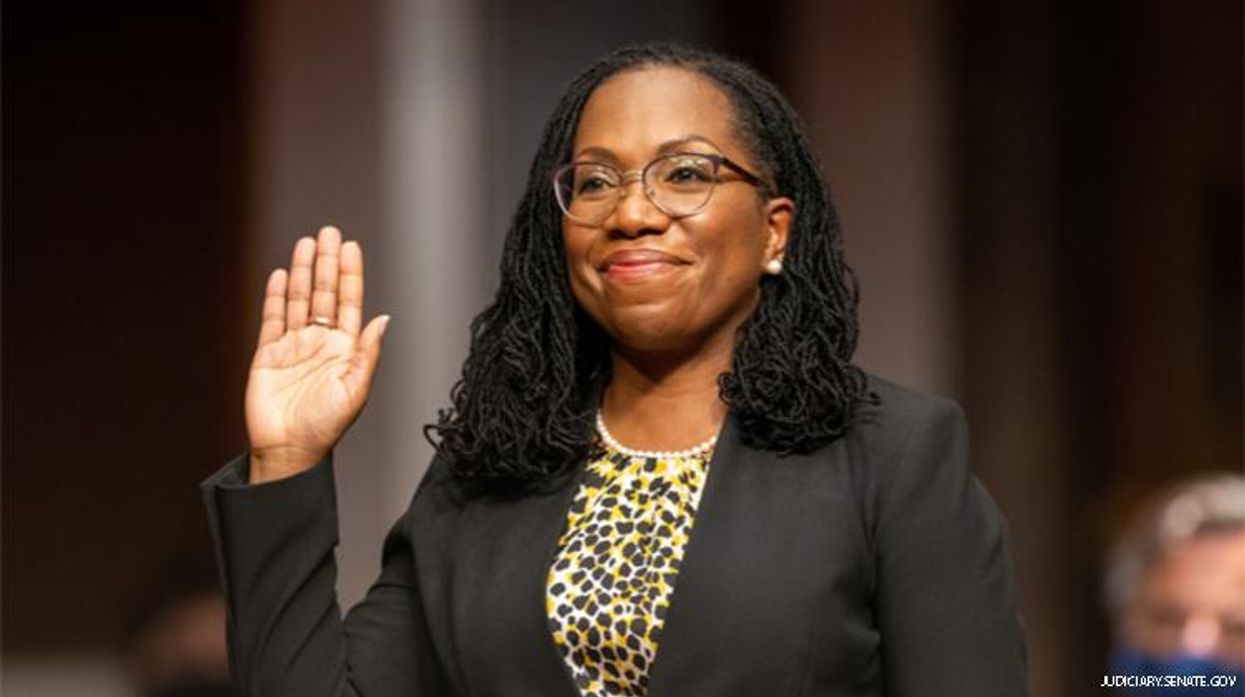Politics
Ketanji Brown Jackson Confirmed to SCOTUS Despite GOP Smear Attempts

Three Republican senators, however, broke with their party to confirm the first Black woman to the U.S. Supreme Court.
April 07 2022 2:54 PM EST
trudestress
By continuing to use our site, you agree to our Privacy Policy and Terms of Use.

Three Republican senators, however, broke with their party to confirm the first Black woman to the U.S. Supreme Court.
Judge Ketanji Brown Jackson has been confirmed as a justice of the U.S. Supreme Court, with three Republicans breaking with their party, which largely opposed her.
The Senate confirmed her Thursday by a vote of 53-47, with three Republicans joining all Democrats and independents to confirm her as the first Black woman to sit on the nation's highest court. Sens. Susan Collins of Maine, Lisa Murkowski of Alaska, and Mitt Romney of Utah were the Republicans. She will be sworn in this summer, after Justice Stephen Breyer retires. She is currently a judge on the U.S. Court of Appeals for the D.C. Circuit and has been a public defender and vice chair of the U.S. Sentencing Commission.
Senate Minority Leader Mitch McConnell characterized Jackson as a far-left judge and other Republicans grilled her about marriage equality -- which she supports -- and tried to paint her as soft on crime due to her sentences in child pornography cases, although legal analysts said the sentences she handed down were within accepted parameters. U.S. Rep. Marjorie Taylor Greene even smeared the three Republicans who supported Jackson as "pro-pedophile" and called the Democrats "the party of pedophiles."
Jackson had the backing of LGBTQ+ and other civil rights groups after President Joe Biden announced her nomination to the court, and they are hailing her confirmation. Even though she had once sat on the board of a private school that had an antigay statement on its website, she was a supporter of LGBTQ+ equality. She once said she was primarily working on fundraising plans for the school and didn't know about the antigay statement.
"We are thrilled to join in the celebration today of the historic and bipartisan confirmation of Judge Ketanji Brown Jackson to the U.S. Supreme Court," Imani Rupert-Gordon, executive director of the National Center for Lesbian Rights, said in a press release. "As a leading civil rights organization that works through the courts to seek equity and justice for LGBTQ people, we are acutely aware of how important it is to have a judiciary that reflects the diversity of this country.
"Judge Jackson is immensely qualified to serve on the nation's highest court and brings important professional and experiential diversity to the position, which will benefit us all. Her perspective will enrich the Court's deliberations and her presence will increase public confidence in the institution. Judge Jackson has already inspired us with her extraordinary professional accomplishments and contributions, and we know that she will continue to inspire this and future generations as an exceptional Supreme Court Justice."
"LGBTQ rights are under attack all across this country, and today's confirmation of Judge Ketanji Brown Jackson to the U.S. Supreme Court is a critical step to ensure our hard-won progress is not reversed by those using the courts to fight outdated culture wars," added GLAAD President and CEO Sarah Kate Ellis. "Judge Jackson's experience and judicial temperament will make her one of the most qualified justices ever to serve on the Court. GLAAD congratulates Judge Jackson and our entire nation on this historic and long overdue representation."
"Words can only partly express the soul-deep joy we feel in this moment," said Ben Jealous, president of People for the American Way. "The confirmation of Judge Ketanji Brown Jackson, who will be the first Black woman on the Supreme Court, caps so many years of striving and struggle by Black women persevering in the fight for an equal voice in our society. The future Justice Jackson is a person of matchless credentials and a demonstrated commitment to civil rights and the Constitution, who is poised to shatter one of our country's oldest glass ceilings. As the grandson of a Black woman who fought for civil rights throughout the twentieth century and the father of a Black daughter who sees a new day dawning for her generation, I could not be more proud."
One of the cases Jackson will hear in the court's next term, which begins in October, will involve whether a web designer has the right to refuse service to same-sex couples who want to set up wedding websites.
Charlie Kirk DID say stoning gay people was the 'perfect law' — and these other heinous quotes